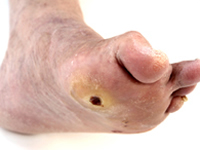Experts list ways to tackle diabetic foot ulcers

Medical practitioners have called on the Federal Government to take decisive steps towards addressing the worrisome burden of complications associated with Diabetes Mellitus, particularly foot ulcers and amputations among Nigerians living with the condition.
Urging FG to initiate, implement and sustain a National Diabetes Foot Care Policy, experts in the field say such policy in place would adequately address the healthcare needs of Nigerians living with diabetes – especially now that Nigeria has the highest population of patients with diabetes foot complications in Africa.
Though preventable, records show that diabetic foot complication is the leading cause of admission, amputation and mortality in diabetic patients worldwide.
The healthcare professionals drawn from the United States of America, South Africa and Nigeria, gave the charge at a workshop tagged “Initiating, Implementing and Sustaining a National Diabetes Foot Care Policy” organised to chart the way forward for diabetic care in Nigeria.
Director of Rainbow Specialist Medical Centre, Dr. Afoke Isiavwe, told The Daily Times that the workshop was aimed at empowering health workers with much needed skills to help prevent, identify and reduce the risk of diabetes-related foot amputations in the country.
The Consultant Endocrinologist, said this was crucial because Nigeria and indeed, Africa, cannot afford to watch while her citizens come down with complications of diabetes mellitus especially in a situation where the Continent was already burdened with infectious diseases.
“Nigeria is also suspected to have the highest number of persons living with diabetes on the African Continent. Indeed, local data shows that we are already beginning to experience increase in diabetes prevalence in Nigeria, and with this increased prevalence accompanying increase in complications like diabetes mellitus related foot ulcers and amputations”, she said.
Juvenile diabetes
Chief Medical Director, Abubakar Tafawa Balewa University Teaching Hospital (ATBUTH), and the National President of the Diabetes Association of Nigeria (DAN), Dr Mohammed Alkali, revealed that as at the end of 2015, about five million Nigerians were living with diabetes, out of which 1.56 million were new cases diagnosed last year alone. Alkali added that there were still lots of undiagnosed diabetes in Nigeria.
His words: “We also have diabetes in young people which is also a major threat called juvenile diabetes, which is an emerging disease in Nigeria now. We see people less than 17 years being diagnosed with diabetes.
“Another major threat is that we have had children diagnosed at infancy with diabetes and the issue of diabetes is that it is not only a disease that is composed of sugar, sugar is all over the body, but the complications of diabetes are the issues. We have issues which affect the eyes, kidneys, heart; we have issues of diabetes causing hypertension and food disease.”
Subsidy and NHIS
Listing the way forward, the DAN President called on government and manufacturers to subsidise diabetic drugs because they are very expensive and beyond the reach of many Nigerians living with diabetes.
Apart from subsidising the drugs, “we also have to look at an alternative source of funding the National Health Insurance Scheme (NHIS) to increase coverage,” he noted.
Alkali pointed out that the country’s current policy is not conducive for diabetic patients, hence the need for a more holistic one that would comprehensively address many of the complications associated with the disease.
Foot care team
For Dr Andrew Clarke, a South African medical expert, reducing foot ulcers and amputations requires a multidisciplinary foot care team.
Clarke recommended early detection of risk factors for foot ulcers and amputations such as infections while appealing to those affected to visit podiatrists for appropriate foot wear.
Also, Head, Department of Medicine, College of Health Sciences, University of Abuja, Prof. Felicia Anumah, stressed the need for healthcare workers to constantly educate diabetic patients on the risk factors for foot ulcers and amputations.
Patient education
The Professor of Endocrinology and Diabetology, affirmed that diabetic education remains one of the most effective ways of managing diabetes while reminding medical practitioners that they owe patients the responsibility of education. “The first step to prevention is patient education. The more information you can provide your patient, the better they understand the condition and adhere to treatment”, she said.
She identified wrong foot wear, poor foot hygiene and infections as some of the risk factors for foot ulcers and amputations.








